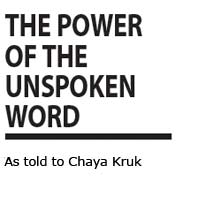Down Syndrome 1979, Part 4 The First Year: Hope vs. Reality

Summary: Tzipora and Yehuda try to manage their reactions to advice-giving and other comments by family and friends in the first weeks after Rafael’s birth, and are helped immensely by their visit to Rav Shmuel Yaakov Weinberg, zt”l, as well as their conversations with other empathetic mentors. The bris is postponed as the baby is hospitalized to stabilize his body temperature. The next step is a urologic examination to determine whether he could have a bris at all. Anticipating trouble, Tzipora brings her father and Rabbi Taub, zt”l, to the appointment, where Rabbi Taub proves to the smug doctor that all is well. The day of the bris finally arrives. It is a happy occasion, full of simcha and brachos.
As soon as the festivities of the bris were over, reality set in. Yehuda’s parents and brother made their exit by highlighting all the special needs supports Rafael Shlomo Boruch could have in a more sophisticated city such as New York. Others wanted to know our game plan for raising Rafael.
This was when I began to focus on the lessons from Tehilim (Psalms) that my twelfth grade teacher, Mrs. Shira Shapiro, taught. One lesson from perek 19 stood out. The perek discusses how the creations in the world give praise to Hashem by doing exactly what He wants each to do, and the creations do Hashem’s will in harmony. No creation is trying to outdo the other or trying to put the other creation in its place. Dovid Hamelech (King David) continues to state that we (klal Yisrael) need to see this as an example of the greatness of the Torah and copy this behavior. Knowing the essence of this perek has been a source of hope for me about Rafael. It made me understand that Hashem created Rafael; therefore, Rafael had a tachlis, a purpose in this world.







